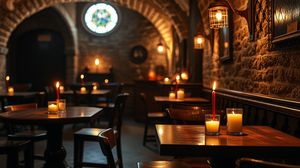
Benjamin Franklin House in London is a fascinating historical site, known for being the only surviving former residence of Benjamin Franklin. The building is a Georgian townhouse located in the heart of the city, which Franklin called home for nearly 16 years from 1757 to 1775. During his stay, Franklin was involved in significant scientific and political pursuits, with his presence marking an important chapter in both American and British history.
The house itself is an architectural gem, preserved to reflect the period of Franklin's residence. Visitors can explore rooms that once served as Franklin's living quarters, experiencing the historical surroundings much as they were during the 18th century. The restoration work carried out on the building took great care to maintain its original character, making it a rare and authentic window into the past.
One of the most intriguing aspects of the Benjamin Franklin House is its use as a dynamic museum and educational center. It features a live history experience, where actors in period costume portray historical figures, bringing Franklin's era to life. This immersive experience provides a unique perspective on Franklin's legacy and his interactions with other key figures of the time.
Benjamin Franklin House also offers insights into Franklin's scientific achievements. The house includes engaging exhibitions on his experiments and inventions, such as his work with electricity, bifocal glasses, and the Franklin stove. This highlights Franklin's role as a pioneering thinker and a key contributor to the Age of Enlightenment.
In an intriguing turn of events, during restoration work on the house, human remains were discovered hidden beneath the building. This unexpected find was linked to anatomical studies carried out by one of Franklin's close friends and fellow occupants, William Hewson. The bones are now part of a captivating narrative that enriches the historical context of the site.
Today, Benjamin Franklin House serves as a vibrant cultural landmark, dedicated to exploring and sharing Franklin's extensive legacy. As both a museum and an active cultural hub, it hosts a range of events and educational programs aimed at connecting the present with the rich tapestry of the past.

Making the Most of Your Visit:
Make sure to catch the Historical Experience show; it adds vivid context to your visit with live actors portraying scenes from Franklin's life.
Take note of the architecture and the original features from the 1700s that have been carefully preserved. Look out for details like the wood paneling and fireplaces to get a real feel for the era.
Spend some time at the exhibition on Franklin's scientific work. It's fascinating to see how his inventions and experiments are showcased in the actual settings where he may have brainstormed these ideas.
Keep an ear out during the house tour for more information on the skeletal remains found during restoration. The story behind them gives a real sense of the building's rich and varied history.
You might want to plan your visit around one of their special events or lectures. They occasionally bring in experts to dive deeper into topics related to Franklin and his time in London, adding an extra layer to your visit.

Visiting Times & Costs:
Benjamin Franklin House is open to the public year-round, except for certain public holidays. It is important to check the specific opening hours before planning your visit, as they can vary depending on the time of year and the type of exhibition or event.
Opening hours:
- Wednesday to Sunday: 12:00 PM - 5:00 PM
Admission Fees:
| Ticket Type | Price |
|---|---|
| Adults | £10.00 |
| Concessions (Students, Seniors) | £8.00 |
| Children (Under 16) | Free |
Some events and special exhibitions may have separate pricing.
Accessibility Information:
Due to the historic nature of the building, there may be some accessibility limitations. The house has several narrow staircases and no elevator, which may make access to upper floors difficult for those with mobility issues. Visitors are encouraged to contact the site in advance to discuss specific access needs and obtain any additional information they may require.

Address & Map:

Nearby:























